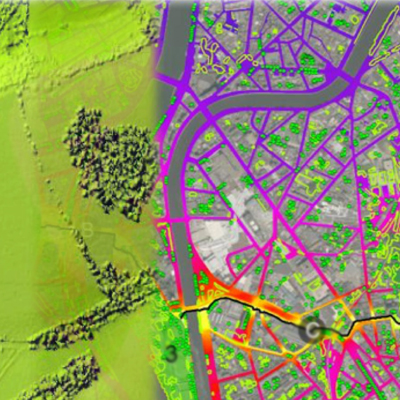Scientists at Cranfield University are working with partners at the National Oceanography Centre (NOC), the University of Liverpool and St Andrews University to develop environmentally sustainable solutions for future coastal and shoreline management.
The £1.6 million UK Research and Innovation (UKRI)-funded Co-Opt project will develop new tools to allow better decisions to be made to both protect coasts from changing climate and help deliver net zero ambitions.
Coastal flooding was the second highest risk after pandemic flu on the UK government's risk register in 2017 and over 1.8 million homes are at risk of coastal flooding and erosion in England alone.
Protecting the coast by maintaining hard 'grey' defences against flooding and erosion such as traditional sea walls is not always cost-effective. Sustainable coastal management will require a broader range of actions, and greater use of softer 'green' solutions that work with nature, including the restoration of coastal habitats such as saltmarshes or vegetated dunes.
Dr Anil Graves, Senior Lecturer - Land Use Systems, Centre for Environmental and Agricultural Informatics, Cranfield University, said: "Cranfield is delighted to be part of the Co-Opt project and we are looking forward to working on this important topic with such a diverse research team. The project will apply ecological, economic, and social science methods to evaluate the benefits and responses associated with different coastal management options."
Dr Laurent Amoudry, Associate Head of Marine Physics and Ocean Climate at the National Oceanography Centre, said: "NOC will quantify the positive and negative environmental impacts of different management approaches under future climate scenarios. We are excited to work with coastal managers in England, Wales and Scotland, as well as international partners, to establish new tools to quantify social and economic values of approaches that work with nature. Our results will allow better decisions to be made that both protect our coasts from the changing climate and also help deliver other key objectives, such as net zero."
The overall aim of the Co-Opt project is to develop a new integrated, interdisciplinary system-based framework that will allow decision-makers to consider the full system context around coastal systems and how they interact and respond to different coastal management solutions.
Within the project, Cranfield University will focus on applying economic and social sciences to value ecosystem services under different scenarios and work with stakeholders to identify how people respond to grey and green approaches to coastal zone management.
The research will draw on the unique mix of expertise in Cranfield's Centre for Environmental and Agricultural Informatics team, covering economic modelling, land use systems, foresight and future planning, spatial analysis, and risk and resilience analysis.

